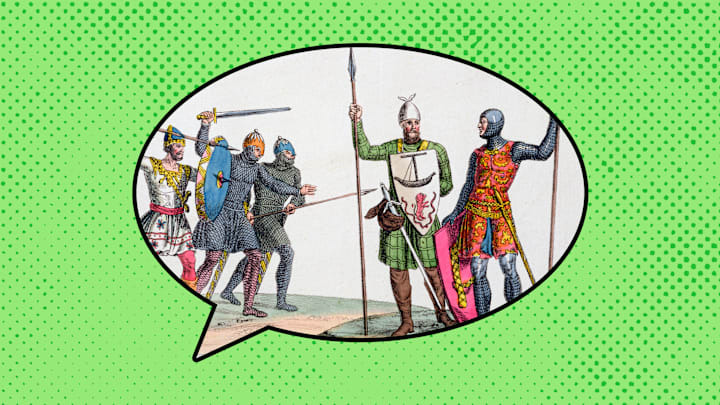Although we call the language spoken by the Anglo-Saxons “Old English,” English speakers today won’t find much in common between it and the language we have now. More than 1000 years ago, English was still being written using long-abandoned letters like þ (known as “thorn”), ƿ (“wynn”) and ð (“eth” or “thæt”). It had a different phonology and a much more complex grammatical structure than we have today that relied on a complicated series of word endings and inflections to convey meaning rather than a predictable syntactic word order.
Old English also had a rich array of inventive and intriguing words, many of which have either long since dropped out of use or were replaced by their continental equivalents after the Norman Conquest of England, and so would be all but unrecognizable to modern English speakers—which is a shame, given just how imaginative the Old English vocabulary could be. Here are the origins and meanings of 20 fantastic, long-forgotten Anglo-Saxonisms.
1. Attercoppe

First recorded in a medical textbook dating from the 11th century, attercoppe was the Old English word for a spider; it literally means “poison head.” The word remained in use in English right through to the 1600s, but only survives today as attercop or attercap in a handful of British English dialects.
2. Breóst-hord
Breóst-hord literally means “breast-treasure,” and was used in Old English literature to refer to what we might call the heart, the mind, or the soul today—namely, a person’s inner workings and feelings.
3. Candeltreow

Old English had the word candelstæf for what we’d call a candlestick today, but it also had the word candeltreow—literally a “candle-tree”—for a candelabra, or a candlestick with more than one branch.
4. Cumfeorm
Cuma (a “comer”) meant a houseguest, a visitor, or a stranger in Old English, and feorm referred to food or supplies and provisions for a journey. Cumfeorm, ultimately, is “stranger-supplies”—another word for hospitality, or for entertaining strangers.
5. Ealdor-bana

Ealdor or aldor is related to the modern English word elder and was used in Old English to mean either an ancestor or superior, or a life or lifespan in general. A bana, meanwhile, was a killer or a destroyer, or a weapon that had been used to cause a death—so an ealdor-bana, literally a “life-destroyer,” was a murderer or something with fatal or murderous consequences.
6. Earsling
No, not another name for a ear bandage. Earsling actually brings together the Old English equivalent of arse, ears or ærs, and the suffix –ling, which is related to the –long of words like livelong, headlong, and endlong. It ultimately means “in the direction of your arse”—or, in other words, backwards. Just like attercop, arseling also still survives in a handful of English dialects.
7. Eaxl-gestealla
Eaxle was the Old English word for your shoulder or armpit (which is still sometimes called the “oxter”), or for the humerus bone of the upper arm. An eaxl-gestealle is literally a “shoulder-friend”—in other words, your closest and dearest friend or companion.
8. Eorþæppla

Cucumbers were “earth-apples”—eorþæppla—in Old English.
9. Frumbyrdling
As far as words that should have never left the language go, frumbyrdling is right up there at the top of the list: It’s an 11th-century word for a young boy growing in his first beard.
10. Gesibsumnes
Gesibsumnes (the ge– is roughly pronounced like “yeah”) literally means something along the lines of “collective peacefulness.” It referred to the general feeling of friendship, companionship, or closeness between siblings or members of the same family.
11. Gléo-dreám

Dreám meant “joy” or “pleasure” in Old English (so not “dream,” which was swefen). Gléo-dreám literally means “glee-joy,” but it specifically referred to the feeling of pleasure that comes from listening to music. The sound of a musical instrument, incidentally, was sometimes called orgel-dreám (literally “pride-pleasure”), while the art of ability to play an instrument was dreámcræft.
12. Hleahtor-smiþ
This “laughter-smith” is someone who makes you laugh.
13. Hleów-feðer
Hleów-feðer means “shelter-feather,” but is used figuratively in some Old English literature to refer to a protecting arm put around someone.
14. Insticce
It’s not entirely clear what the Old English insticce, or “inside-stitch,” actually referred to, but if it didn’t describe a painful “stitch” caused by physical exertion, it probably referred to a general prickling or tingling sensation—what we’d now call “pins and needles.”
15. Lárþéow

Lárþéow—which later became lorthew before it disappeared from the language in the mid-13th century—was an Old English word for a schoolteacher. It literally means “teaching-slave.”
16. Meolcliðe
Meolcliðe, meaning “milk-soft,” was used to describe anything or anyone exceptionally gentle or mild-tempered.
17. On-cýðig
On-cýðig literally means “un-known,” but that’s not to say that it meant the same as “unknown.” Although its exact meaning is debatable, it’s thought on-cýðig referred to the despondent feeling caused by missing something that is no longer close at hand—in other words, the feeling of “knowing” about something or someone, and then either having to leave it behind, or having it taken from you.
18. Sǽ-flód
The “sea-flood” was the incoming tide in Old English.
19. Self-ǽta
A “self-eater” was a cannibal—or, by extension, an animal that preyed on other animals of the same species.
20. Unweder
And when the weather gets bad, it’s no longer “weather” but “un-weather”—an Old English word for a storm.
Read More Articles About Language:
